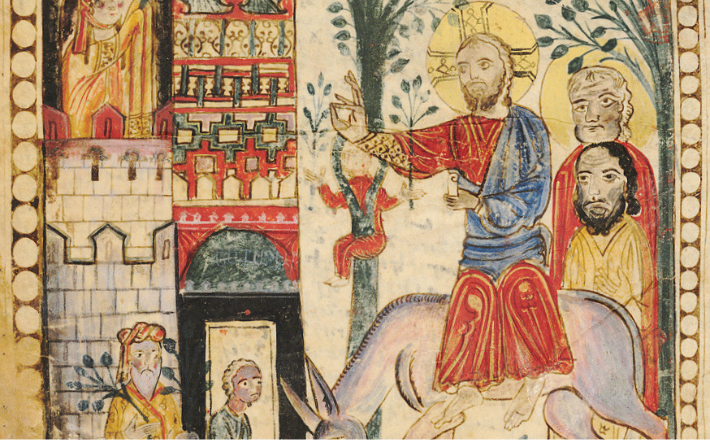Commentary on Luke 19:29-44
It’s the kind of thing politicians think about—the optics of an entrance. The thought that Jesus paid attention to how he was perceived as he made his way into Jerusalem is a little unsettling perhaps. But the text suggests that it was Jesus’ idea—rather than, say, some disciples acting as campaign managers—to present himself as the fulfillment of Zechariah’s vision.
So, it appears Jesus wanted to make an entrance, and his choice of transportation was a key connection to Zechariah’s prophecy. As the group moves closer to the city, Jesus sends a couple of his disciples out to steal a donkey. Notice: Luke doesn’t say “borrow.” He doesn’t say “rent.” This is a heist.
Jesus knew the owners would likely have a negative reaction to this plan—donkeys are valuable, especially young donkeys with lots of years ahead of them—hence he gives the disciples something to say if they get caught. Was saying “The Lord needs it” effective precisely because the identity of this “Lord” remained vague? Perhaps it was like saying a powerful person needs this creature, and you’d better hand it over. Or maybe there was some sort of mysterious divine persuasion at work. Either way, the disciples lead the colt back to Jesus.
Though procuring the beast was easy enough (as it turned out), there is still a problem. Luke is careful to tell us: This donkey had never been ridden. Zechariah’s prophecy doesn’t exactly specify an unbroken colt, but it implies it. Now, anyone with horse experience knows the combination of a green steed, a strange rider, and a roaring crowd is a recipe for trouble. Horses who have never been ridden don’t like being ridden, and I can’t imagine donkeys are any different. Bucking, rearing, spinning, snapping, kicking—there are lots of things equines can do to express displeasure in such situations.
Yet, according to Luke, the disciples just throw some clothing on top of the animal and hoist Jesus aboard. If the donkey acts up, we don’t hear about it. Instead, we are left to assume that the ride went beautifully, despite the cloaks underfoot, the yelling of the multitude, and the conflict about the yelling of the multitude that eventually ensues. Jesus got the entrance he planned, and even has the perfect comeback when detractors question the festivities.
Did Jesus enjoy the ride, do you think?
Luke doesn’t tell us. But by the time Jesus gets close enough to really see the city, any delight gives way to tears. The donkey, the entrance, the stones—these are the things that Jesus can work with. But when it comes to Jerusalem or, really, the people of Jerusalem, he just weeps. There on that donkey, Jesus laments, Jesus warns, Jesus scolds any who will listen.
How long he lingered there, brooding over the city and its future, we don’t know, but eventually the procession makes its way to the temple. There Jesus lashes out at the people who made their living in the temple court. He calls these vendors a den of robbers—though one can’t help remembering that he had just shoplifted a donkey himself.
If the Jesus who began this ride seemed like someone entering the city on his own terms, by the end of the trail we find him sad and angry about the peace-less-ness of the human world. The Jesus riding into Jerusalem embodies these seeming contradictions—well-prepared and undone, joyful and grief-stricken, gracious and furious.
None of this stops Jesus, of course, from pressing on and doing what he is called to do. “Every day Jesus was teaching in the temple,” Luke writes, suddenly shifting away from the mayhem of the cleansing scene. And after the days of teaching come the supper and the garden and the hill outside the city. There is order and chaos, beauty and agony, love and terror in those days too.
Whatever else God is up to, then as now, it involves living with such contradictions, until God brings all of it to a good end. This is something we need to hear again from time to time: that the Christian life is as unsettled as the last days of our Lord, and how could it not be? Joyful, yes, but everything else too.
We don’t know what happened to that donkey once the ride was over. Perhaps it wandered off like the crowds, back to where it came from. Or maybe a disciple kept it, smuggling it handfuls of grain gleaned from fields they passed by. Or maybe it was taken in by a wandering Samaritan, heading out on the dangerous road from Jerusalem to Jericho.
PRAYER OF THE DAY
Hosanna, King,
Blessed are you, our king, who comes in the name of the Lord! Peace in heaven, and glory in the highest heaven! Even if our voices were silenced, creation itself would rise up to praise you! Hosanna in the Highest! Amen.
HYMNS
My song is love unknown ELW 343, H82 458, NCH 222
All glory, laud, and honor ELW 344, H82 154, 155, UMH 280, NCH 216, 217
Prepare the royal highway ELW 264
Prepare the way, O Zion H82 65
Prepare the way of the Lord UMH 207
CHORAL
Ride on, King Jesus, Larry Fleming


April 13, 2025